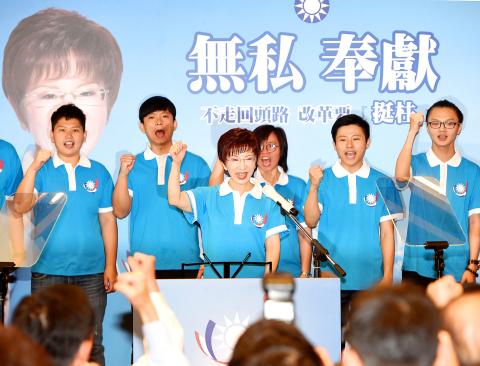Chinese Nationalist Party (KMT) Chairwoman Hung Hsiu-chu (洪秀柱) yesterday urged party members to give her four more years to reform the party as she officially announced her bid for re-election as party chairperson.
Addressing a news conference in Taipei’s Sun Yat-sen Memorial Hall, Hung said the KMT was able to build the nation and lead it to overcome predicaments thanks to party members like former premier Sun Yun-shuan (孫運璿), who dedicated his life to the development of the nation until his death.
“If the KMT fails to walk on the right path, it would be dismissed by voters, feel the despair of youth and be abandoned by younger generations in the 2018 and 2020 elections,” Hung said.

Photo: Chu Pei-hsiung, Taipei Times
Hung said what really matters for the KMT’s next leader is their character, the level of trust the public bestows upon them and their willingness to lead the way for younger generations, rather than their personnel network and political experience.
Success is still a long way away and the road ahead is too tumultuous for any leader to clear all obstacles within a year, Hung said.
“The next four years will determine whether the KMT can get back on its feet again. Therefore, I hereby ask my fellow party members to give me four more years to carry out my reform projects for the party,” she said.
Hung was elected party chairwoman on March 26 last year to serve the remaining term of the sixth KMT chairman, Ma Ying-jeou (馬英九), who was re-elected on July 20, 2013, before stepping down on Dec. 3, 2014, to take responsibility for the KMT’s defeat in the nine-in-one elections that year.
Former president Ma was succeeded by New Taipei City Mayor Eric Chu (朱立倫) on Jan. 19, 2015, who resigned on Jan. 16 last year after losing the presidential race to the Democratic Progressive Party’s Tsai Ing-wen (蔡英文).
Hung also proposed several plans for the KMT, including democratizing the party, creating a mobile application for party members to voice their opinions and responding to public demands that the KMT remove its stigma as a “dinosaur party.”
Hung is one of six party members that have announced their intention to run for KMT leadership.
Nominees are required to collect signatures form at least 3 percent of all party members before Saturday to make their candidacy official. The election is scheduled for May 20.

Alain Robert, known as the "French Spider-Man," praised Alex Honnold as exceptionally well-prepared after the US climber completed a free solo ascent of Taipei 101 yesterday. Robert said Honnold's ascent of the 508m-tall skyscraper in just more than one-and-a-half hours without using safety ropes or equipment was a remarkable achievement. "This is my life," he said in an interview conducted in French, adding that he liked the feeling of being "on the edge of danger." The 63-year-old Frenchman climbed Taipei 101 using ropes in December 2004, taking about four hours to reach the top. On a one-to-10 scale of difficulty, Robert said Taipei 101

Nipah virus infection is to be officially listed as a category 5 notifiable infectious disease in Taiwan in March, while clinical treatment guidelines are being formulated, the Centers for Disease Control (CDC) said yesterday. With Nipah infections being reported in other countries and considering its relatively high fatality rate, the centers on Jan. 16 announced that it would be listed as a notifiable infectious disease to bolster the nation’s systematic early warning system and increase public awareness, the CDC said. Bangladesh reported four fatal cases last year in separate districts, with three linked to raw date palm sap consumption, CDC Epidemic Intelligence

US climber Alex Honnold left Taiwan this morning a day after completing a free-solo ascent of Taipei 101, a feat that drew cheers from onlookers and gained widespread international attention. Honnold yesterday scaled the 101-story skyscraper without a rope or safety harness. The climb — the highest urban free-solo ascent ever attempted — took just more than 90 minutes and was streamed live on Netflix. It was covered by major international news outlets including CNN, the New York Times, the Guardian and the Wall Street Journal. As Honnold prepared to leave Taiwan today, he attracted a crowd when he and his wife, Sanni,

Taiwanese and US defense groups are collaborating to introduce deployable, semi-autonomous manufacturing systems for drones and components in a boost to the nation’s supply chain resilience. Taiwan’s G-Tech Optroelectronics Corp subsidiary GTOC and the US’ Aerkomm Inc on Friday announced an agreement with fellow US-based Firestorm Lab to adopt the latter’s xCell, a technology featuring 3D printers fitted in 6.1m container units. The systems enable aerial platforms and parts to be produced in high volumes from dispersed nodes capable of rapid redeployment, to minimize the risk of enemy strikes and to meet field requirements, they said. Firestorm chief technology officer Ian Muceus said